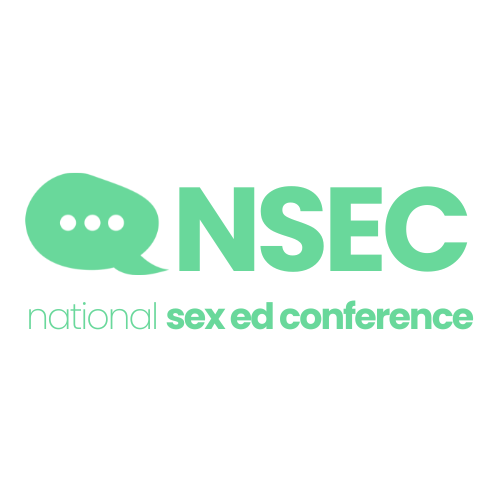Workshops
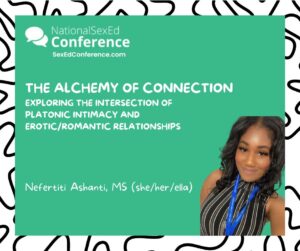
The Alchemy of Connection:
Exploring the Intersection of Platonic Intimacy and Erotic/Romantic Relationships
Nefertiti Ashanti, MS (she/her/ella)
We will discuss the significance of the role of platonic intimacy and community in erotic relationships, illuminating how deep connections impact healthy sexual dynamics. Through research, lively discussions, real-life anecdotes, and interactive activities, attendees will embark on an engaging journey into the heart of human sexuality.
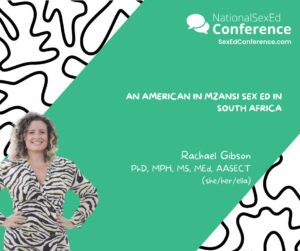
An American in Mzansi:
Sex Ed in South Africa
Rachael Gibson, PhD, MPH, MS, MEd, AASECT (she/her/ella)
International support for comprehensive sex education has grown in recent years while the United States continues to struggle. This presentation will share lessons learned from South African educators in their fight for a national sex ed curriculum. Concrete strategies will be shared to support communities in bringing sex ed to youth.
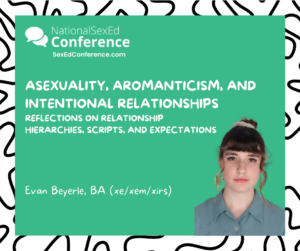
Asexuality, Aromanticism, and Intentional Relationships:
Reflections on Relationship Hierarchies, Scripts, and Expectations
Evan Beyerle, BA (xe/xem/xirs)
Asexual and aromantic identities and experiences are overlooked in general as well as in sexuality education. However, these identities are not only important in their own right but can also provide a lens to reflect on current relationship norms, offering guidance for people of all identities in developing intentional relationships.
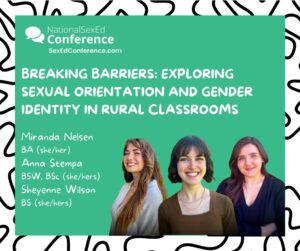
Breaking Barriers:
Exploring Sexual Orientation and Gender Identity in Rural Classrooms
Miranda Nelsen, BA Sociology (she/her), Anna Stempa, BSW, BSc (she/hers), & Sheyenne Wilson, BS (she/hers)
This session will explore effective strategies for gaining support from rural communities when addressing sexual orientation and gender identity in the classroom. Focusing the discussion on respect, kindness, and antiharassment efforts, rural schools present more openness to discuss LGBTQ+ identities in the classroom, allowing more equitable sex education for youth.
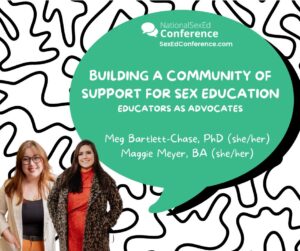
Building a Community of Support for Sex Education:
Educators as Advocates
Meg Bartlett-Chase, PhD (she/her) and Maggie Meyer, BA (she/her)
School-based sex educators provide vital education to students while facing ongoing attacks against their professional knowledge, access to resources, and goals of inclusivity. The presenters have been fostering support for sex education across Minnesota and will provide you with tools and skills to do the same in your communities.
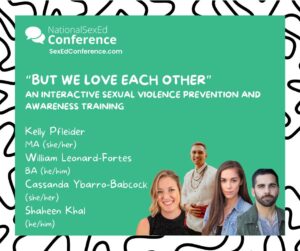
“But We Love Each Other”:
An Interactive Sexual Violence Prevention and Awareness Training
Kelly Pfleider, MA (she/her), William Leonard-Fortes, BA (he/him), Cassandra Ybarra-Babcock (she/her), & Shaheen Khal (he/him)
The training begins with a conflict-centered story of a couple, Frankie and Max, and their friends who witness their unhealthy relationship. Following the performance, Pure Praxis guides an interactive discussion, collaboratively generating creative solutions in an entertaining, open-minded space. The dynamic fusion of scripted and improvised interaction transcends traditional boundaries.
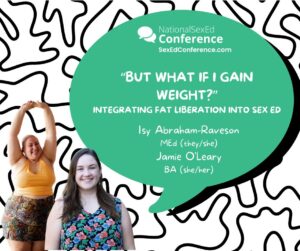
“But What If I Gain Weight?”:
Integrating Fat Liberation into Sex Ed
Isy Abraham-Raveson, MEd (they/she) and Jamie O’Leary, BA (she/her)
Damaging messages about bodies are entrenched in health education. This workshop introduces fat liberation frameworks and applies them to sex ed curricula. Participants will incorporate fat liberation into existing lessons and practice responding to scenarios. Through sex ed, we can co-create a world where all people see themselves as whole.
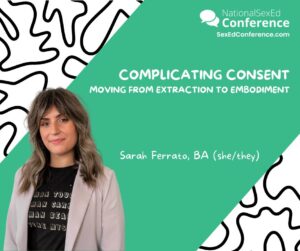
Complicating Consent:
Moving from Extraction to Embodiment
Sarah Ferrato, BA (she/they)
For years, sex educators have leaned heavily on the FRIES consent model, emphasizing a binary of yes and no. But where does curiosity, hesitation, or relationality fit? This workshop offers a container to move consent education from a deficit, risk-reduction model to one of pleasure, prevention, and maybe even liberation!
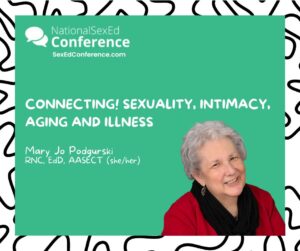
Connecting! Sexuality, Intimacy, Aging and Illness
Mary Jo Podgurski, RNC, EdD, AASECT (she, her)
Ageism is a part of many cultures; maintaining or creating connections in healthy relationships are key components of mental and physical health. Physical illness raises challenges and can increase loneliness. This workshop explores interactive learning skills to enhance education for those over 70 dealing with illness.
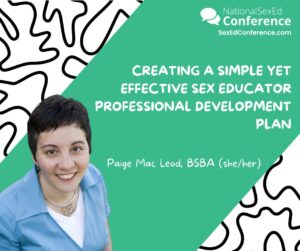
Creating a Simple yet Effective Sex Educator Professional Development Plan
Paige Mac Leod, BSBA (she/her)
Learn about free tools and resource lists to identify and fill sex educator knowledge and skill gaps. We’ll explore how to adapt the tools to fit your needs and priorities and review how to apply the tools with staff to create a simple yet effective sex educator professional development plan.
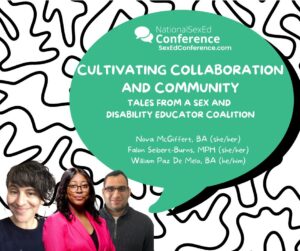
Cultivating Collaboration and Community:
Tales from a Sex and Disability Educator Coalition
Nova McGiffert, BA (she/her), Falon Seibert-Burns, MPH (she/her), William Paz De Melo BA (he/him), & Laura Dadswell, MS, BSL (she/her)
This dynamic panel discussion features sexuality educators and disability professionals from Pennsylvania’s peer network on disability-centered sex education. Hear firsthand experiences, successes, and hurdles navigating challenges related to ableist stigma, policy, and intersectional frameworks. Gain confidence and strategies to collaborate with partners in your communities to prioritize disability-centered sex education.
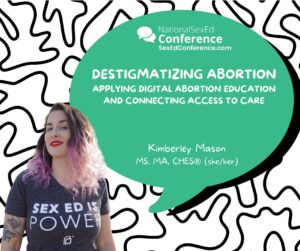
Destigmatizing Abortion:
Applying Digital Abortion Education and Connecting Access to Care
Kimberley Mason, MS, MA, CHES® (she/her)
Whether or not your lesson plans include abortion, educators get questions about it. Planned Parenthood’s Chat/Text digital sexual health education hotline and destigmatizing abortion care protocol enables users to learn what many people really want to know about abortion and didn’t think to ask while connecting users to care.
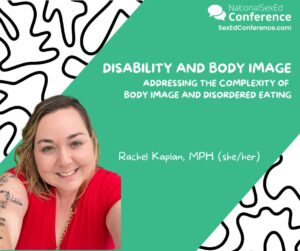
Disability and Body Image:
Addressing the Complexity of Body Image and Disordered Eating
Rachel Kaplan, MPH (she/her)
People with Disabilities (PWDs) are at higher risk for disordered eating and body dysmorphia due to stigma regarding food preferences, textures, and “ideal” weight. This session will address biases towards PWD and why standard practices of care regarding weight, BMI, caloric intake & MyPlate recommendations are not inclusive, causing mental and physical harm.
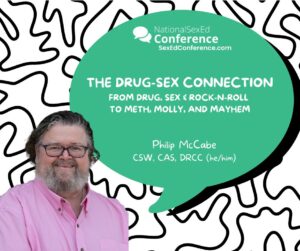
The Drug-Sex Connection:
From Drug, Sex & Rock-N-Roll to Meth, Molly, and Mayhem
Philip McCabe, CSW, CAS, DRCC (he/him/his)
While the use of alcohol or other intoxicating substances before or during sex is certainly nothing new, the sexual addiction model popular in the late 80’s was dismissed as heteronormative. Sexualized drug use or “chemsex” can indicate problematic sexual behavior and can be challenging to address even among sex-positive professionals.
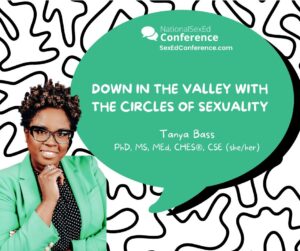
Down in the Valley with the Circles of Sexuality
Tanya Bass, PhD, MS, MEd, CHES®, CSE (she/her)
Join us for a unique workshop experience as we delve into the complexities of sexuality through the lens of the hit TV series “P-Valley.” This session will explore the “Circles of Sexuality” model, which provides a framework for understanding the various dimensions of human sexuality.
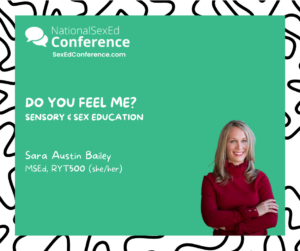
Do You Feel Me?
Sensory & Sex Education
Sara Austin Bailey, MSEd, RYT500 (she/her)
Is your sex ed instruction disconnected from the body? From felt experience? It doesn’t have have to be! Incorporate sensory, inquiry, and mindfulness practices to help students deepen connections to the body and skillfully navigate opportunities to connect with other bodies – if and when they want.
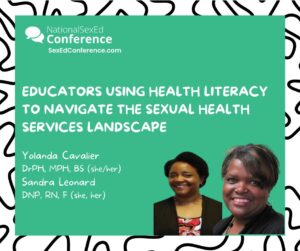
Educators Using Health Literacy to Navigate the Sexual Health Services Landscape
Yolanda Cavalier, DrPH, MPH, BS (she/her), Sandra Leonard, DNP, RN, F (she, her)
Skills-based instruction in sexual health education that focuses on identifying and assessing available services could provide an opportunity to help students develop the necessary capacity and skills specific to finding and accessing needed services. This session will provide examples of skills-based activities and lessons to implement in health education settings.
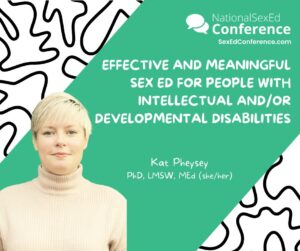
Effective and Meaningful Sex Ed for People with Intellectual and/or Developmental Disabilities
Kat Pheysey, PhD, LMSW, MEd (she/her/hers)
This workshop offers inventive methods for inclusive and meaningful sexual education for individuals with intellectual and/or developmental disabilities. Addressing diverse learning needs and societal stigmas, it equips practitioners with tools to foster understanding, promote autonomy, ensure dignified engagement in sexual health discussions, and overcome common barriers.
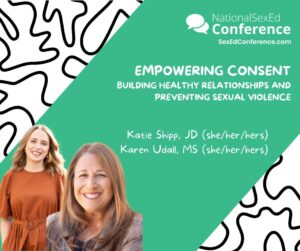
Empowering Consent:
Building Healthy Relationships and Preventing Sexual Violence
Katie Shipp, JD (she/her/hers) & Karen Udall, MS (she/her/hers)
This workshop equips educators to combat sexual violence by integrating consent and healthy relationship education into curricula. Participants will learn strategies for facilitating these critical conversations with students, discover resources for curriculum integration, and explore methods to empower students as agents of change.
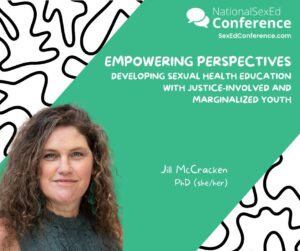
Empowering Perspectives:
Developing Sexual Health Education with Justice-Involved and Marginalized Youth
Jill McCracken, PhD (she/her)
Our session introduces “Choosing Myself,” an innovative sex education program that integrates trauma-informed care to address the unique needs of marginalized youth. We highlight our innovative, inclusive curriculum, designed from community feedback, and emphasize how this approach creates safer, more effective educational environments and promotes equitable learning opportunities.
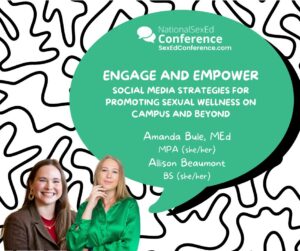
Engage and Empower:
Social Media Strategies for Promoting Sexual Wellness on Campus and Beyond
Amanda Bule, MEd, MPA (she/her), Allison Beaumont, BS (she/her)
Harnessing the power of social media to promote sexual health education can be an impactful way to make a difference beyond the classroom. This workshop will explore social media content creation tips, accessibility through universal design, and methods of handling pushback online.
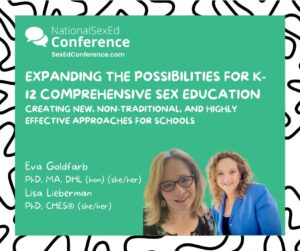
Expanding the Possibilities for K-12 Comprehensive Sex Education:
Creating New, Non-Traditional, and Highly Effective Approaches for Schools
Eva Goldfarb, PhD, MA, DHL (hon) (she/her) & Lisa Lieberman, PhD, CHES® (she/her)
Based on our research reveals that effective K-12 sex education often takes place outside of formal sex education, across the curriculum, and throughout the school. Attendees will engage in participatory activities to identify non-traditional sex education opportunities in schools and explore implications for schools, teachers, and teacher training and preparation.
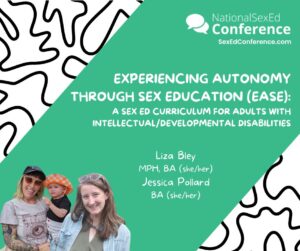
Experiencing Autonomy through Sex Education (EASE):
A Sex Ed Curriculum for Adults with Intellectual/Developmental Disabilities
Liza Bley, MPH, BA (she/her) and Jessica Pollard, BA (she/her)
For more than a decade, the Responsible Sex Education Institute of Planned Parenthood of the Rocky Mountains has facilitated versions of the “EASE” curriculum. Now, we are revamping it based on multiple sources of feedback. Presenters are excited to share lessons learned, best practices, and access to activities from the curriculum.
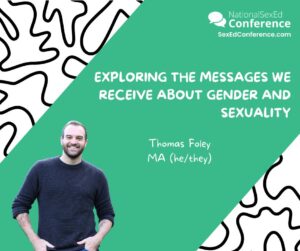
Exploring the Messages We Receive about Gender and Sexuality
Thomas Foley, MA (he/they)
In this discussion-based workshop, attendees will explore the messages they’ve received about gender and sexual orientation from 5 different agents of influence: family, friends, school, media, and religion. Attendees will then identify the messages they may send to their students and their implications for learning and development.
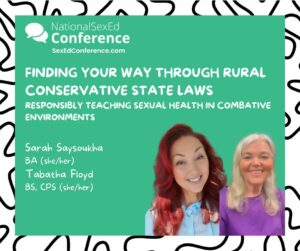
Finding Your Way Through Rural Conservative State Laws:
Responsibly Teaching Sexual Health in Combative Environments
Sarah Saysoukha, BA (she/her) & Tabatha Floyd, BS, CPS (she/her)
Dealing with sources giving misinformation and disinformation while providing medically accurate education? You will learn how to navigate teaching sexual health education within the laws of your rural, conservative state while empowering youth to make decisions surrounding their sexual health. We will discuss the challenges, barriers, and successes our program faced implementing our family life curriculum.
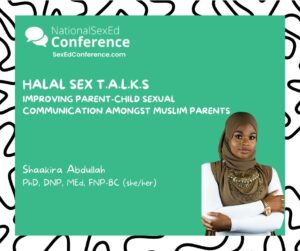
Halal Sex T.A.L.K.S:
Improving Parent-Child Sexual Communication Amongst Muslim Parents
Shaakira Abdullah, PhD, DNP, MEd, FNP-BC (she/her)
Parents play a crucial role in their children’s development, yet often struggle with sexuality topics. This is especially true for Muslim parents. As a result, youth may engage in risky sexual behaviors. This workshop will teach professionals how to assist parents with providing sex education consistent with one’s beliefs.
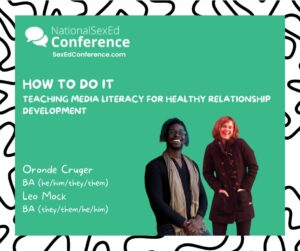
“How to Do It:
Teaching Media Literacy for Healthy Relationship Development”
Oronde Cruger, BA (he/him/they/them) & Leo Mock, BA (they/them/he/him)
The pandemic found many young people more often learning lessons about sex from what they found on a screen more than experimenting in person. So now, it’s important to take some time to focus on media literacy to be able to enjoy pop culture more intentionally.
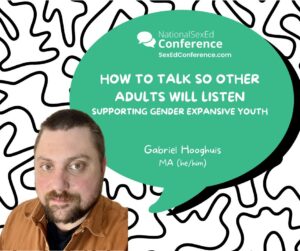
How to Talk So Other Adults Will Listen:
Supporting Gender Expansive Youth
Gabriel Hooghuis, MA (he/him)
This workshop will share tips and strategies related to talking with coworkers who are reluctant to embrace gender diversity, including, but not limited to, working with trans, nonbinary, and gender-expansive youth.
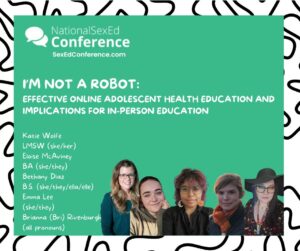
I’m Not a Robot:
Effective Online Adolescent Health Education and Implications for In-Person Education
Katie Wolfe, LMSW (she/her), Eloise McAviney, BA (she/they), Bethany Diaz, B.S. (she/they/ella/elle), Emma Lee (she/they), & Brianna (Bri) Rivenburgh (all pronouns)
Planned Parenthood’s Chat/Text program provides personalized answers to adolescents’ urgent sexual health questions and helps them decide the next steps they’ll take to improve their health. Join program staff for a skills-driven session that explores best practices used in the program and brainstorms how to apply them in your community.
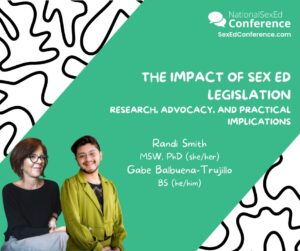
The Impact of Sex Ed Legislation:
Research, Advocacy, and Practical Implications
Randi Smith, MSW, PhD (she/her) and Gabe Balbuena-Trujillo, BS (he/him)
In 2019, Colorado passed legislation mandating that – when taught in Colorado public schools – sex education must not use shame-based language, disregard consent information, or exclude diverse identities. By researching students’ sex ed experiences both before and after 2019, we explore the impacts legislation has on sexual knowledge and health.
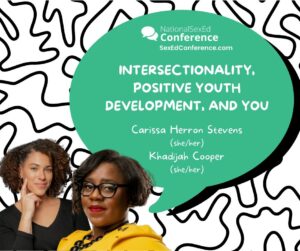
Intersectionality, Positive Youth Development, and You
Carissa Herron Stevens (she/her) and Khadijah Cooper (she/her)
How do your intersecting identities shape your interactions with youth? Uncover and expand your perspective of power and privilege through guided reflection and activities. Together, we’ll leverage these insights alongside positive youth development principles, equipping you to create authentically inclusive environments that nurture the learning of all youth.
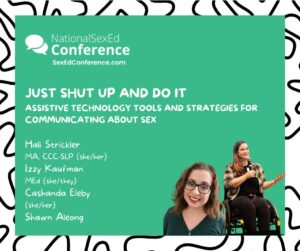
Just Shut Up and Do It:
Assistive Technology Tools and Strategies for Communicating About Sex
Hali Strickler, MA, CCC-SLP (she/her), Izzy Kaufman, MEd (she/they), Cashanda Eleby (she/her), & Shawn Aleong
Participants will learn about supporting access to sex education vocabulary and content for disabled people who use communication devices and/or are nonspeaking. This session includes a discussion and demonstration of assistive technology devices. Participants will visit stations to explore augmentative and alternative communication devices and other technological options.
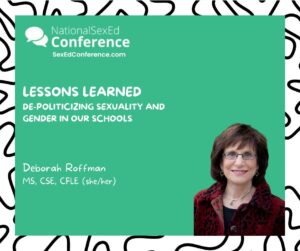
Lessons Learned:
De-Politicizing Sexuality and Gender in Our Schools
Deborah Roffman, MS, CSE, CFLE (she/her)
As United States schools and districts experience attacks against their sexuality and gender programming – many of them viciously targeted – it’s vital to be able to differentiate the five unique categories of pushback they may receive; understand the historical context of the tactics used; and, have at hand specific strategies for responding effectively.
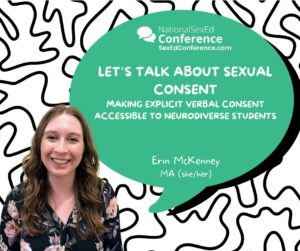
Let’s Talk About Sexual Consent:
Making Explicit Verbal Consent Accessible to Neurodiverse Students
Erin McKenney, MA (she/her/hers)
How can educators support neurodiverse groups of students in learning to navigate sexual consent? Current research suggests that students tend to believe consent is a crucial and under-discussed topic in sexual education. This session will explore evidence-based methods to teach about sexual consent, particularly with neurodiverse groups of learners.
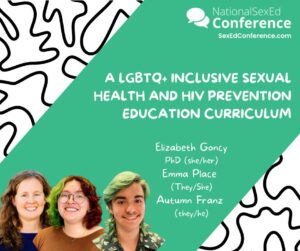
A LGBTQ+ Inclusive Sexual Health and HIV Prevention Education Curriculum
Elizabeth Goncy, PhD (she/her), Emma Place (they, she), Autumn Franz (they/he)
This workshop will provide: 1) an overview of LGBTQ+ sexual health education; 2) the development of an evidence-based, LGBTQ+ inclusive sexual health curriculum; 3) pilot data from 52 participants; 4) feedback from 24 community stakeholders; and 5) a review of findings and next steps.
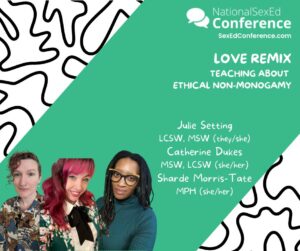
Love Remix:
Teaching About Ethical Non-Monogamy
Julie Setting, LCSW, MSW (they/she), Catherine Dukes, MSW, LCSW (she/her), & Sharde Morris-Tate, MPH (she/her)
Love Remix builds and expands knowledge around ethical, non-monogamous relationship styles. This program is a celebratory exploration of the diverse ways in which people can build meaningful connections. Using engaging discussion and interactive activities, Love Remix will help sex educators teach the ins and outs of ethical non-monogamy.
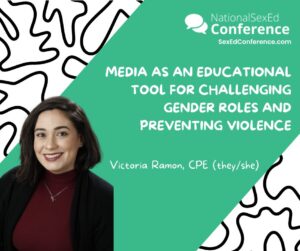
Media as an Educational Tool for Challenging Gender Roles and Preventing Violence
Victoria Ramon, CPE (they/she)
This session will focus on programming efforts that involve the use of media to address gender roles and domestic violence, sexual assault, and stalking. Examples and data from successful prevention programming will help participants gain tools to utilize media in their own practices.
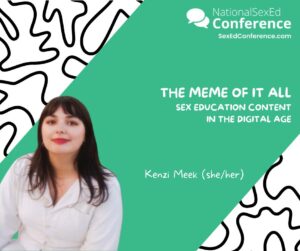
The Meme of It All:
Sex Education Content in the Digital Age
Kenzi Meek (she/her)
This workshop opens dialogues surrounding how to best meet the education needs of young people today through social media platforms. How do we reach them where they’re at? Make some memes! We’ll walk through what makes a successful sex education meme, engagement strategies, and why this matters.
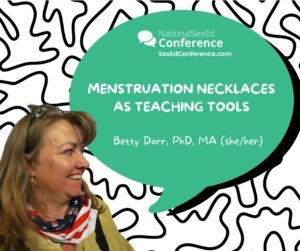
Menstruation Necklaces as Teaching Tools
Betty Dorr, PhD, MA (she/her/hers)
This session will review menstruation necklaces for human sexuality classes. Menstruation necklaces use different bead colors and shapes to 1) reflect the menstrual, follicular, ovulatory, and luteal phases of the cycle; 2) represent follicular stimulating hormone, luteinizing hormone, estrogen, and progesterone systems; and 3) portray aspects of fertility across the cycle.
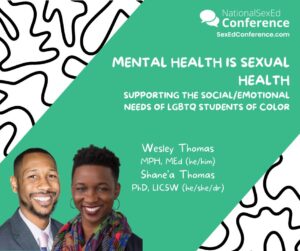
Mental Health is Sexual Health:
Supporting the Social/Emotional Needs of LGBTQ Students of Color
Wesley Thomas, MPH, M.Ed (he/him) & Shane’a Thomas, PhD, LICSW (he/she/dr)
Students of color that sit at the intersections of trans and queer identities are often explicitly or unintentionally omitted in sexual health curricula. With the field of sexual health expanding into areas like healthy relationships, students of color still grapple with developing healthy connections within their community.
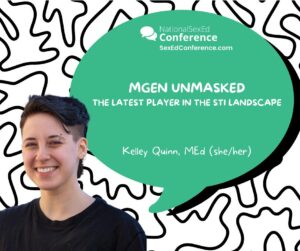
MGen Unmasked:
The Latest Player in the STI Landscape
Kelley Quinn, MEd (she/her)
Discover the silent assailant in our midst: mycoplasma genitalium (MGen). Despite MGen matching or surpassing chlamydia and gonorrhea rates in some populations, MGen awareness lags. Join us to uncover vital insights while igniting advocacy for widespread testing and awareness. Together, let’s equip ourselves with the knowledge to safeguard our communities.
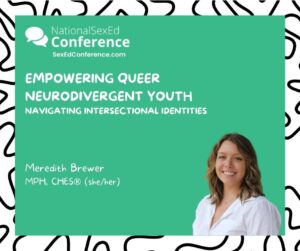
Empowering Queer Neurodivergent Youth:
Navigating Intersectional Identities
Meredith Brewer, MPH, CHES® (she/her)
Let’s explore the intersection of queerness and neurodiversity experiences among youth. Led by skilled facilitators, uncover the challenges and triumphs of queer neurodivergent youth. Gain insights and actionable strategies to champion inclusivity and advocacy. This session deepens understanding and support for youth, relevant to parents, educators, and community members.
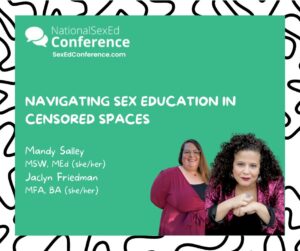
Navigating Sex Education in Censored Spaces
Mandy Salley, MSW, MEd (she/her) & Jaclyn Friedman, MFA, BA (she/her)
Censorship is trendy. Book bans, educational gag orders, and online censorship have swept the nation. We are fighting back and defending the freedom of education. The Woodhull Freedom Foundation and EducateUs have been advocating against censorship attempts. This workshop will prepare sex educators to rebuff any and all censorship attempts.
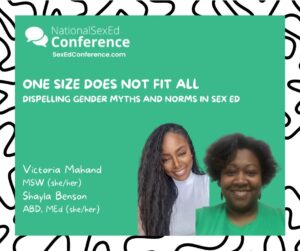
One Size Does NOT Fit All:
Dispelling Gender Myths and Norms in Sex Ed
Victoria Mahand, MSW (she/her) & Shayla Benson, ABD, MEd (she/her)
This workshop will explore the impacts of rigid gender norms and implicit bias on healthy sexual exploration and discovery for adolescents. By examining dominant narratives, participants will recognize how internal and often hidden assumptions about gender harm youth development, connections in family, and overall sex education.
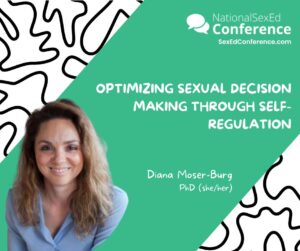
Optimizing Sexual Decision Making Through Self-Regulation
Diana Moser-Burg, PhD (she/her)
Optimizing sexual decision-making enhances health and well-being. Self-regulation, a core component of executive functioning, greatly influences mental health, social success, and achievement. This presentation lays a foundation for centering sex education in resilience-based, trauma-informed, inclusive practice that promotes values-based autonomy to practice harm-free and protected sex while managing impulsivity.
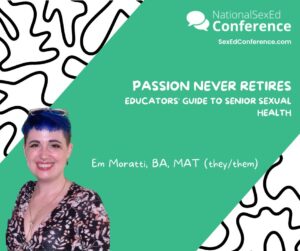
Passion Never Retires:
Educators’ Guide to Senior Sexual Health
Em Moratti, BA, MAT (they/them)
The presentation covers sexual and reproductive health topics for seniors, incorporating standard topics into conversations with folks who “already know this” and common barriers to building trust. The session covers perimenopause, menopause, and sexual dysfunction as folks age, experience disability, or transition. Participants will learn why they happen, how they relate to aging, and potential treatment.
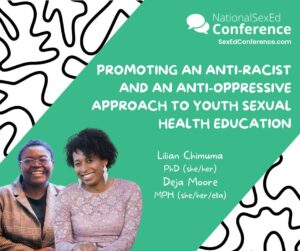
Promoting an Anti-Racist and an Anti-Oppressive Approach to Youth Sexual Health Education
Lilian Chimuma, PhD (she/her) & Deja Moore, MPH (she/her/ella)
This session highlights the value of collaborative program efforts in understanding, addressing, and informing work around equitable efforts, practices, and issues in sex education. Attendees will gain an understanding of the work and outcomes achieved, lessons learned, and reflect on opportunities to advance sex education within an antiracist framework.
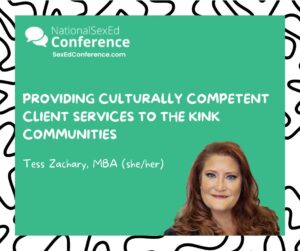
Providing Culturally Competent Client Services to the Kink Communities
Tess Zachary, MBA (she/her)
More than 30% of adults in America engage in erotic power exchange and kink, yet this underserved population is often stigmatized and discriminated against by mental health and healthcare professionals. Learn how to communicate and better serve these clients and distinguish between BDSM and intimate partner violence.
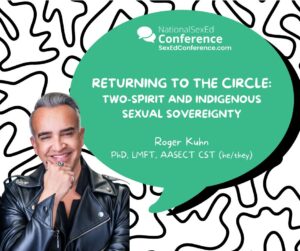
Returning to the Circle:
Two-Spirit and Indigenous Sexual Sovereignty
Roger Kuhn, PhD, LMFT, AASECT CST (he/him/they)
Gender and sexual orientation-based violence at the hands of colonizers has been a lived experience for the Indigenous people of the North American continent since the invasion of 1492. Despite centuries of genocide and forced assimilation, Two-Spirit people and tradition have survived and are thriving.
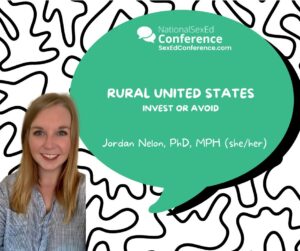
Rural United States:
Invest or Avoid
Jordan Nelon, PhD, MPH (she/her)
Public school sex education in the southern, rural United States is riddled with difficulties and usually takes adaptations for compliance. A program based on one state’s family life policy was created and is currently undergoing rigorous testing. Practitioners and researchers will share the creation process, lessons learned, and current programmatic outcomes.
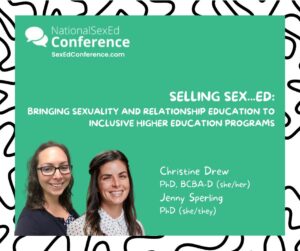
Selling Sex…Ed:
Bringing Sexuality and Relationship Education to Inclusive Higher Education Programs
Christine Drew, PhD, BCBA-D (she/her) & Jenny Sperling, PhD (she/they)
Implementing sexuality and relationship education in inclusive higher education settings includes both pitfalls and opportunities for faculty, staff, students, and students’ parents. We will describe the implementation processes for two universities in the United States and the survey results on sexual and relationship education programming in inclusive higher education.
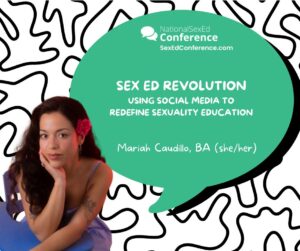
Sex Ed Revolution:
Using Social Media to Redefine Sexuality Education
Mariah Caudillo, BA (she/her)
Explore how social media can transform sex education. Learn to create engaging, inclusive content, break taboos, build online communities, and navigate censorship. Whether you’re an aspiring sex educator or looking to become a “sexedfluencer,” this workshop helps you discover the ever-evolving landscape of social media in the world of sex education.
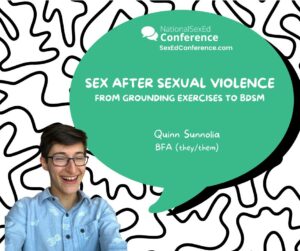
Sex After Sexual Violence
From Grounding Exercises to BDSM
Quinn Sunnolia, BFA (they/them)
Participants will understand the importance of healing through increasing choice and autonomy. They will unpack societal narratives about the ways sex and relationships should be to increase options for people experiencing sexual violence. The workshop will provide tools for coping with triggers and working towards embodied consent.
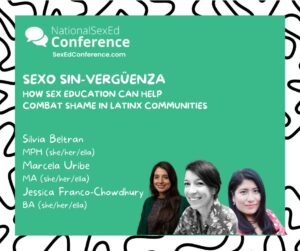
Sexo Sin-Vergüenza:
How Sex Education Can Help Combat Shame in Latinx Communities
Silvia Beltran, MPH (she/her/ella), Marcela Uribe, MA (she/her/ella), & Jessica Franco-Chowdhury, BA (she/her/ella)
Taboos around sex are deeply ingrained in many Latinx cultures. This can negatively impact people’s lives, health, and relationships. Drawing on data pointing to the ubiquitous nature of stigma, we will lead a discussion on how digital and in-person sex ed can help normalize sex positivity and open communication.
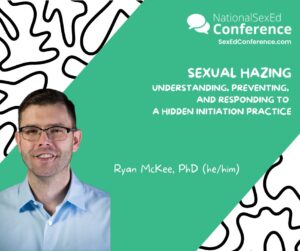
Sexual Hazing:
Understanding, Preventing, and Responding to a Hidden Initiation Practice
Ryan McKee, PhD (he/him)
This interactive presentation addresses the often-ignored practice of sexual hazing within educational settings. It aims to equip educators and administrators with the knowledge to prevent, identify, and respond to incidents of sexual hazing in middle school, high school, and college settings.
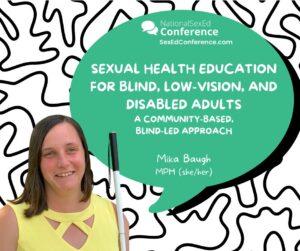
Sexual Health Education for Blind, Low-Vision, and Disabled Adults:
A Community-Based, Blind-Led Approach
Mika Baugh, MPH (she/her)
This session will discuss a blind-led sexual health education intervention for blind, low-vision, and disabled adults in the United States. We will discuss our community-based approach, share strategies and recommendations for meaningfully engaging blind/low-vision individuals in sexual health education, and include hands-on exploration of accessible intervention materials.
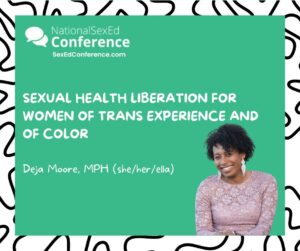
Sexual Health Liberation for Women of Trans Experience and of Color
Deja Moore, MPH (she/her/ella)
This session will provide health inequity data as it relates to women of trans experience and of color sexual health experiences; note strategies for addressing white supremacy, transphobia, and barriers related to our health and well-being; discuss opportunities to provide anti-racist and liberatory practices to improve our sexual health outcomes.
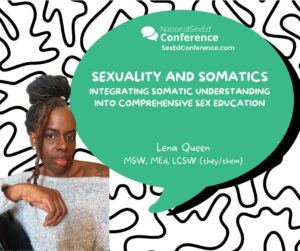
Sexuality and Somatics:
Integrating Somatic Understanding into Comprehensive Sex Education
Lena Queen, MSW, MEd, LCSW (they/them)
This workshop offers a holistic approach to understanding and experiencing sexuality by integrating somatic practices with sexology. Through a series of interactive exercises and discussions, attendees will learn practical somatic tools to enhance their somatic understanding and education of sexuality.
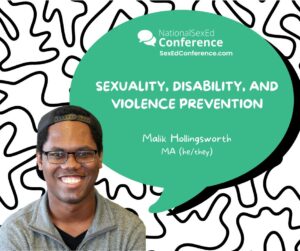
Sexuality, Disability, and Violence Prevention
Malik Hollingsworth, MA (he/they)
Despite having some of the highest rates of sexual violence, disabled folks are often aren’t included in our educational materials when we discuss violence prevention. This workshop will discuss the different models of disability, the relationship between disability and sexual violence across time, and ways to improve prevention education curricula.
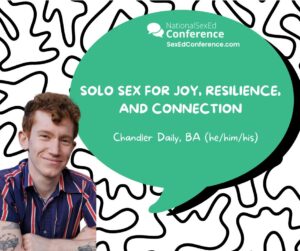
Solo Sex for Joy, Resilience, and Connection
Chandler Daily, BA (he/him/his)
The longest sexual relationship many people will have is with themselves. This workshop will illuminate both barriers and strategies for participants’ self-sex lives and how self-sex can be a tool for processing body image, identity development, emerging sexuality, and more.
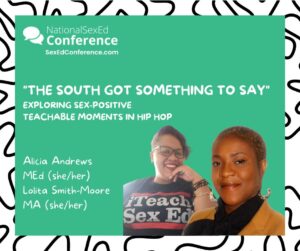
“The South Got Something to Say”:
Exploring Sex-Positive Teachable Moments in Hip Hop
Alicia Andrews, MEd (she/her/hers) & Lolita Smith-Moore, MA (she/her)
Rap, an element of hip-hop, is an evolving genre of music. Hip Hop culture dominates three areas of society: politics, education, and corporate America, which are the same areas that influence sex education. During this interactive workshop, we will explore various contentious rap songs and review lyrics for sex-positive messages.
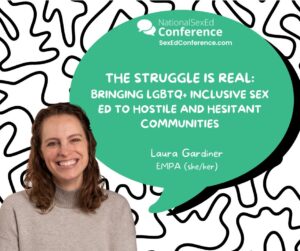
The Struggle Is Real:
Bringing LGBTQ+ Inclusive Sex Ed to Hostile and Hesitant Communities
Laura Gardiner, EMPA (she/her/hers)
In this workshop, we’ll discuss challenges that can emerge when working with hostile or hesitant community partners, parents, and students who push back when we try to include content relevant to LGBTQ+ youth. We will also share lessons learned and tips for how to handle anti-LGBTQ sentiments when providing sex education.
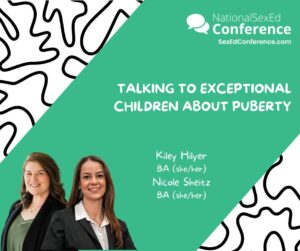
Talking to Exceptional Children About Puberty
Kiley Hilyer, BA (she/her) & Nicole Sheitz, BA (she/her)
Puberty and its physical, emotional, and social changes can be overwhelming to any child. This session offers developmentally appropriate education and resources designed to assist caregivers when talking to children with Autism and higher support needs about puberty and their changing body, internet safety, and consent.
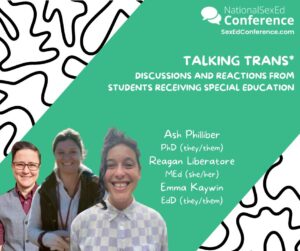
Talking Trans*:
Discussions and Reactions from Students Receiving Special Education
Ash Philliber, PhD (they/them), Reagan Liberatore, MEd (she/her), & Emma Kaywin, EdD (they/them)
This workshop will share how a class of students with individualized education programs was offered an opportunity to ask any questions they would like about trans-specific sex ed. The class came to cover a range of unexpected and important topics. Participants will explore trans-specific questions and ways to answer them.
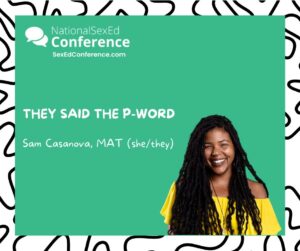
They Said the P-Word
Sam Casanova, MAT (she/they)
This workshop is intended to support educators in reflecting upon their definitions, relationships, and biases around pleasure (feeling good)– to understand that pleasure is to be accessed and experienced by all, including young people. We will examine how pleasure is a measure of safety, a tool for harm reduction, and violence prevention.
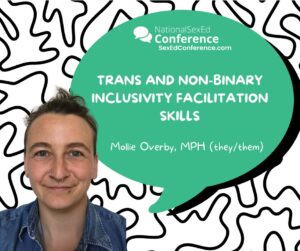
Trans and Non-Binary Inclusivity Facilitation Skills
Mollie Overby, MPH (they/them)
While we cannot always teach LGBTQ+ content, we can facilitate in ways that make LGBTQ+ youth feel more welcome. Join us in examining biases and learning best practices for answering questions in ways that are inclusive to trans and non-binary youth. We‘ll have time to share experiences and practice responses!
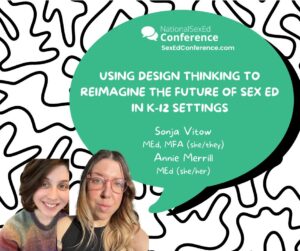
Using Design Thinking to Reimagine the Future of Sex Ed in K-12 Settings
Sonja Vitow, MEd, MFA (she/they) and Annie Merrill, MEd (she/her)
This session will ask participants to reimagine sex ed through a design-thinking framework. To push the boundaries of how we teach sex ed and reexamine the limitations educators are given, we invite participants to brainstorm topics they feel should be included in current sex ed curricula.
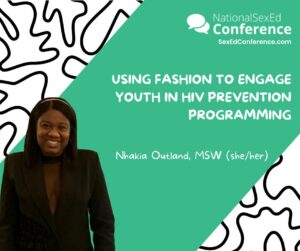
Using Fashion to Engage Youth in HIV Prevention Programming
Nhakia Outland, MSW (she/her)
This workshop will discuss the importance of creative engagement in sex education and why it is important for social workers and the community when engaging youth in HIV prevention. It will also discuss an innovative approach to engaging youth. We conclude with an interactive Q&A period.
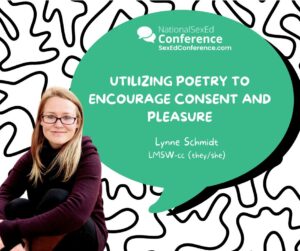
Utilizing Poetry to Encourage Consent and Pleasure
Lynne Schmidt, LMSW-cc (they/she)
Poetry is often able to say and express things we are unable to. For survivors of sexual violence, reconnecting with their bodies can be difficult. This workshop will explore poetry as a means to explore our bodies, consent, good and pleasurable sex, and healing.
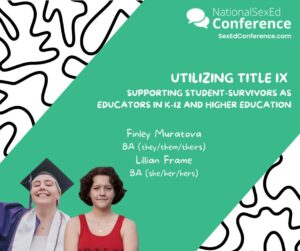
Utilizing Title IX: Supporting Student-Survivors as Educators in K-12 and Higher Education
Finley Muratova, BA (they/them/theirs) & Lillian Frame, BA (she/her/hers)
As educators, we often teach complex and heavy topics such as consent in an attempt to prevent sexual violence. But we need the tools to support our students if prevention fails. This workshop will help educators build a toolkit for supporting student survivors via Title IX in educational institutions and settings.
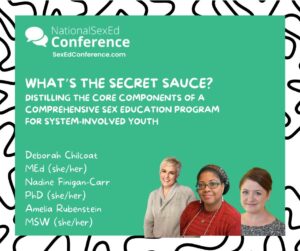
What’s the Secret Sauce?
Distilling the Core Components of a Comprehensive Sex Education Program for System-Involved Youth
Deborah Chilcoat, MEd (she/her), Nadine Finigan-Carr, PhD (she/her), & Amelia Rubenstein, MSW (she/her)
What makes a program effective? Is it the content of the program, the way the content is taught, or the context in which it is taught? Let’s nosh on new questions about health behavior promotion for system-involved youth and dish about comprehensive sex education programs and strategies that will leave you satisfied!
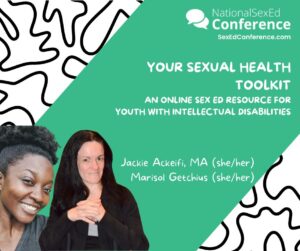
Your Sexual Health Toolkit:
An Online Sex Ed Resource for Youth with Intellectual Disabilities
Jackie Ackeifi, MA (she/her) & Marisol Getchius (she/her)
The “Your Sexual Health Toolkit,” an online resource with sex education tools, was created with youth with disabilities at the center. Come learn about how this tool was created, what it includes, and how you might use it to support sex ed access for youth with disabilities!
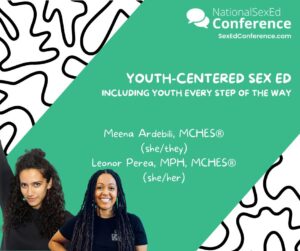
Youth-Centered Sex Ed:
Including Youth Every Step of the Way
Meena Ardebili, MCHES® (she/they) & Leonor Perea, MPH, MCHES® (she/her)
This workshop will teach participants how to include young people in every step of their sexual education programming. Facilitators will share the cultural adjustments they made in their work environments to be more inclusive of youth. Facilitators will share best practices to equip attendees to do the same.
Roundtables
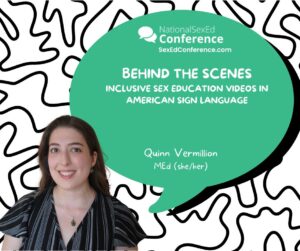
Behind the Scenes:
Inclusive Sex Education Videos in American Sign Language
Quinn Vermillion, MEd (she/her)
Planned Parenthood of Delaware made a series of four sex education videos in American Sign Language. Learn about how we prioritized cultural and linguistic accessibility and centered the Deaf community throughout the process. See our finished videos and companion lessons.
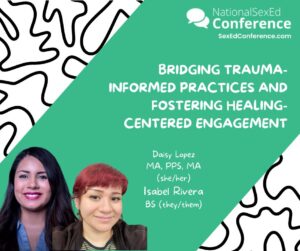
Bridging Trauma-Informed Practices and Fostering Healing-Centered Engagement
Daisy Lopez, MA, PPS, MA (she/her) & Isabel Rivera, BS (they/them)
This interactive workshop will center on trauma-informed care, healing-centered engagement, and the role of sexual health educators. Attendees will practice tailoring educational approaches to fit their community needs, brainstorm the creation of classroom settings that offer safety, hope, and healing, and learn how self-care IS healing-centered engagement.
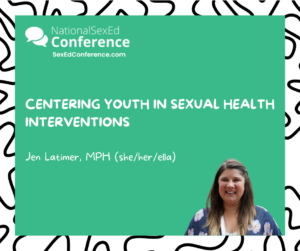
Centering Youth in Sexual Health Interventions
Jen Latimer, MPH (she/her/ella)
Institute of Women and Ethnic Studies Adolescent Health staff will share how we combine personal authenticity, multifaceted training, and qualitative methods assessment to tailor a unique, safe, and supportive learning environment for each sexual health education session. Participants are invited to dive into our process, analyzing opportunities to adapt lesson plans and preserving fidelity while centering youth.

Discussion on Consent, Boundaries, Relationships & Sex Ed for People with Disabilities
Melissa Hochberg, MEd (she/her) & Arlene Lechner, MEd (she/her)
Education about Consent, Boundaries, Relationships & Sex Ed gives people with Intellectual & Developmental Disabilities the ability to make informed & healthy choices, advocate for themselves, prevent abuse, enjoy healthy relationships & see themselves as sexual beings. Ease will lead the discussion on best practices when teaching people with disabilities.
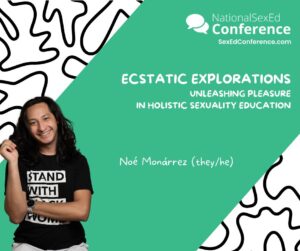
Ecstatic Explorations:
Unleashing Pleasure in Holistic Sexuality Education
Noé Monárrez (they/he)
Get ready for an interactive hour-long workshop on pleasure-centered comprehensive sexuality education! Discover how pleasure-based holistic education provides a framework for understanding human development, navigating social relationships, and prioritizing pleasure, empathy, and organic connection. Let’s explore these transformative values together in a fun, modern setting!
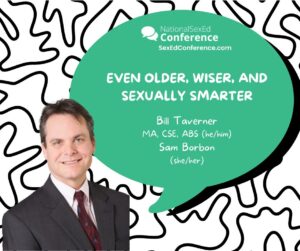
Even Older, Wiser, and Sexually Smarter
Bill Taverner, MA, CSE, ABS (he/him) & Sam Borbon (she/her)
Help us revitalize “Older, Wiser, Sexually Smarter,” the essential sex ed teaching manual for older adults. Participants will receive a free copy of the prior edition to critically examine what was covered before and identify new topics that resonate with older adults. Join us to shape the new edition!
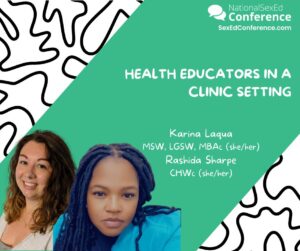
Health Educators in a Clinic Setting
Karina Laqua, MSW, LGSW, MBAc (she/her) & Rashida Sharpe, CHWc (she/her)
Hennepin Healthcare has implemented a model that hosts adolescent health educators and a reproductive health case manager in the clinics to meet with adolescents during their visits to provide care coordination, education, and advocacy. Data shows better outcomes for youth who receive clinical education services during their visits.
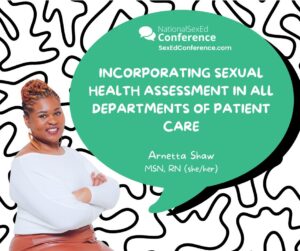
Incorporating Sexual Health Assessment in All Departments of Patient Care
Arnetta Shaw, MSN, RN (she/her)
Sexual health is often not discussed at most points of patient care despite body image and sexual well-being issues resulting from various health and mental diagnoses and their treatments. Sex is a basic need, yet we treat it as taboo luxury in healthcare.
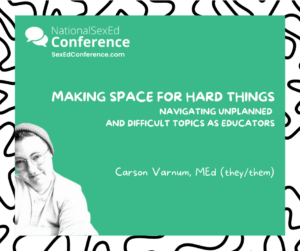
Making Space for Hard Things:
Navigating Unplanned and Difficult Topics as Educators
Carson Varnum, MEd (they/them)
Scary, confusing, harmful, and unexpected things happen all the time in our world and communities. We will explore the role of an educator in difficult moments and how to invite those conversations into our teaching spaces. We will talk through examples and create templates for future events.
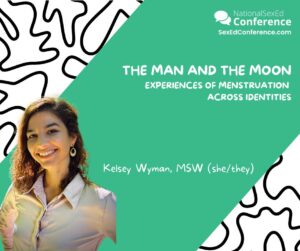
The Man and the Moon:
Experiences of Menstruation Across Identities
Kelsey Wyman, MSW (she/they)
Embark on a journey through the celestial rhythms of menstruation. Delve into the fascinating parallels and distinctions between menstrual cycles in individuals of diverse gender identities. Explore how hormonal fluctuations shape experiences, fostering inclusivity and understanding in reproductive health education.
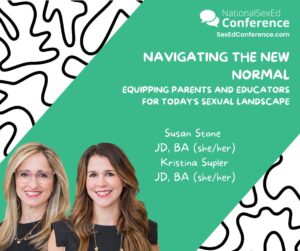
Navigating the New Normal: Equipping Parents and Educators for Today’s Sexual Landscape
Susan Stone, JD, BA (she/her) and Kristina Supler, JD, BA (she/her)
Join Susan Stone and Kristina Supler, co-authors of “Yes, Your Kid,” for an informational session on adolescent sexuality and consent. Leveraging their experience as attorneys and thought leaders in student and athlete defense, attendees will gain practical strategies for supporting young people in today’s complex world of sex and relationships.
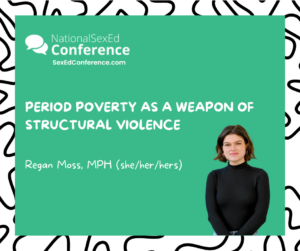
Period Poverty as a Weapon of Structural Violence
Regan Moss, MPH (she/her/hers)
Period poverty is the lack of access to materials that individuals need when managing menses. Period poverty is often a product of economic insecurity; it is less widely recognized as the product of structural violence. Ultimately, the menstrual equity space is a space of struggle with systems that manufacture period poverty.
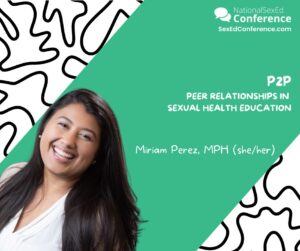
P2P:
Peer Relationships in Sexual Health Education
Miriam Perez, MPH (she/her)
Peer-to-peer programming in sexual health can center the existing connections in a community to deliver sexual health education. In this session, Peer Health Exchange and youth facilitators will dive into peer-to-peer programming, the importance of peer community building in sexual health, and ways to center youth in programming.
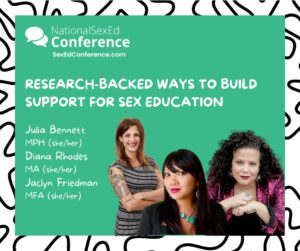
Research-Backed Ways to Build Support for Sex Education
Julia Bennett, MPH (she/her), Diana Rhodes, MA (she/her), & Jaclyn Friedman, MFA (she/her)
Anti-sex education groups have made headway with their lies to make people wary of sex education. So Advocates for Youth, EducateUS, and Planned Parenthood have all invested in messaging research around sex education. Come learn about our collective research and how you can leverage it in effective messaging!
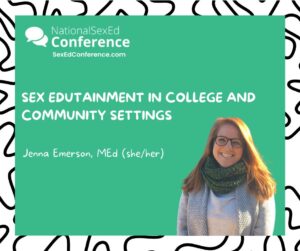
Sex Edutainment in College and Community Settings
Jenna Emerson, MEd (she/her)
In college, sex should be fun, so why not make sex education fun, too? From parodies to sex toy BINGO to drag and burlesque shows, this workshop explores various opportunities to incorporate sexuality-focused educational entertainment (i.e., edutainment) in a college or community setting to increase attendance, engagement and learning.
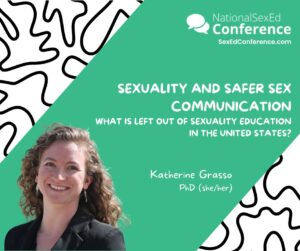
Sexuality and Safer Sex Communication: What Is Left Out of Sexuality Education in the United States?
Katherine Grasso, PhD (she/her)
Sexuality education in the United States often fails to provide young adults with essential skills for safer sex communication, such as discussing consent, contraceptive use, and sexual history. This presentation critiques the effectiveness of both abstinence-only and comprehensive programs, highlighting their shortcomings, especially for LGBTQ+ students, and advocating for more inclusive, practical education.
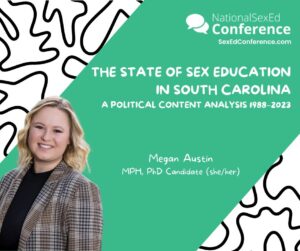
The State of Sex Education in South Carolina:
A Political Content Analysis 1988–2023
Megan Austin, MPH, PhD Candidate (she/her)
This session will take an in-depth look at the state of sex education in South Carolina since 1988: what is permitted, how it is to be implemented, and when changes were integrated. This presentation will cover methods of a political content analysis, the results, and future recommendations for South Carolina.
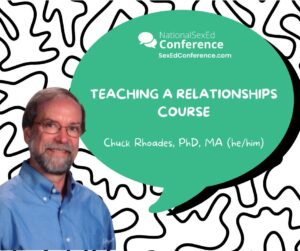
Teaching a Relationships Course
Chuck Rhoades, PhD, MA (he/him/his)
This presentation guides professionals in developing a course on relationships for adolescents in school and community settings. Attendees will approach each class as unique, tailoring content and methodology to the youth participants. It will review instructional activities, mindfulness and communication skills, relationship processes, sexual decisions, emotional experiences, and problem-solving.
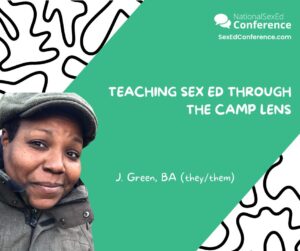
Teaching Sex Ed Through the Camp Lens
J. Green, BA (they/them)
Teaching sex ed through the camp lens fosters a supportive, empowering environment, promoting healthy relationships and informed decision-making amidst nature’s backdrop.
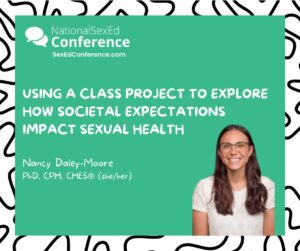
Using a Class Project to Explore How Societal Expectations Impact Sexual Health
Nancy Daley-Moore, PhD, CPH, CHES® (she/her)
Why have students write a paper when they can create a collage? What about having students create a fact sheet or video? This presentation will discuss how a semester-long project assigned in a human sexuality course could both engage and help students develop skills.
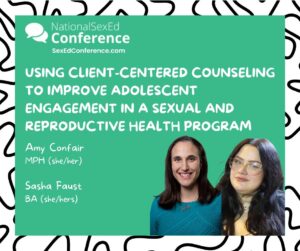
Using Client-Centered Counseling to Improve Adolescent Engagement in a Sexual and Reproductive Health Program
Amy Confair, MPH (she/her), Sasha Faust, BA (she/hers)
AccessMatters’ Health Resource Center program provides sexual and reproductive health counseling, education, services, and referrals to adolescents aged 13-19. Client-centered counseling and motivational interviewing are key methods of successfully engaging adolescents. The training of coordinators to utilize these methods in diverse situations, successes, and lessons learned will be discussed.
